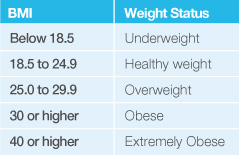How excess weight affects the heart:
Fighting the belly bulge? It's not just a weight concern...its a major heart health concern as well. Did you know that fat around the middle increases your risk of developing fatty deposits in your blood vessels? And its been proven that fat around the waist secretes inflammatory proteins that contribute to the fat deposition in the blood vessels.
This means that even if you are not obese, you are still at an increased risk for heart disease if you have an increased waist size.
What is being overweight?
Overweight and obesity are both defined by Body Mass Index or BMI (which is a ratio of weight to height). A BMI between 25 & 30 places someone in an overweight category and 30 or higher is considered obese. The following link will help you calculate your BMI.
Body Mass Index:
Body Mass Index (BMI) provides a reliable indicator of body fatness for most people and is used to screen for weight categories that may lead to health problems.Calculate Your BMI |
|
|---|---|
What is your BMI?

More reasons to control your weight
The classifications of overweight and obese are not simply labels; there is a dramatic increase in the likelihood of disease as people increase their BMI,
such as:
- Coronary artery disease (CAD)
- Certain cancers
- High blood pressure
- High cholesterol and triglycerides
- Osteoarthritis
- Sleep apnea
- Stroke
- Type 2 diabetes
Obesity itself is not what causes the harm; it is the diseases that are associated with obesity that cause the harm. The costs of these diseases and syndromes are enormous, and that doesn't even begin to calculate the personal, physical, and emotional problems associated with increased BMI.
- Obese people are expected to live 2-4 years less than someone with a healthy weight; the extremely obese (BMI over 40) have 8-10 years taken off their life expectancy. i
- More than one-third of adults in the U.S. are considered overweight and another one-third are obese.
- The medical costs associated with obesity are estimated at over $150 billion dollars.
- Obese people cost an average of $1,429 more in medical services per year than someone who is normal weight.
- What can I do to control my weight?
There is much you can do to control your weight. First of all, there are no easy answers. Reducing and maintaining a healthy weight is one of the best tools we have to forestall or avoid many diseases.
1. Lifestyle: Get support, exercise, drink plenty of water, track your progress, and eat a low-fat and low-calorie diet. 2. Boost Your Metabolism: Maintaining or increasing your lean body mass (muscles) is your best bet for keeping your metabolism going strong. There are a variety of supplements that can help with your metabolism as well. 3. Leucine: The amino acid leucine is great at helping maintain muscle mass, especially in people who are cutting calories and exercising. Shaklee makes getting Leucine into your diet simple and delicious. Check out these simple smoothies that will help you build healthy muscle & lose those unwanted inches. Smoothees with Leucine 4. Protein: Not only does protein help you feel full longer, it also helps you keep your lean body mass. Starting the morning with a good protein or protein shake helps you feel full longer. Here's a delicious protein powder that packs 24 grams of delicious & nutritious protein.
Protein Never Tasted So Good!5. Fiber: The benefits of fiber on weight loss are many. Studies have shown that fiber can help you feel full, support blood sugar, and it helps remove cholesterol from the body as part of a healthy diet. Fiber doesn't have to be bland! Try these scrumptious, chewy, apple & cinnamon bars
Fiber-Meet Flavor!
In closing, work daily to maintain a healthy weight with diet and exercise. Keeping your heart healthy will also keep you away from other health problems.
To your health~
Denise Gaskell
Gaskell Healthy Soltuions
gaskellwellness@comcast.net







